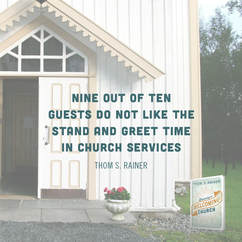 Whenever we plan out our worship services, we try to come up with ways to engage our guests and visitors, those who might be new to our worship. So we plot out talking points, transitions, clear instructions and reference points in our bulletins, and we might even provide a listening guide for the message. All of these planning moments are done knowing that when Sunday worship starts, there are going to be people who may have no idea what's going on. Beyond that though are the unintentional things we do in our worship. And these more often than not I believe are driven by using the wrong sets of eyes. Instead of asking if it's something that will be understood by a visitor, we end up creating barriers for those we're trying to reach. Thom Rainer's book on Becoming a Welcoming Church is an eye-opener for us (pun intended). When we start viewing things we do through the eyes of an outsider, it should give us pause on the value of continuing them. We do this three ways: 1. Insider Language - Let's be honest, we have our own language. It's called Christianese. It uses words that don't make sense unless you're part of our Christian subculture. For someone who comes from a nominal or non-existent church background, they may be confused when we call someone brother or use acronyms or code words. Instead of assuming knowledge, assume you need to explain what things mean to your potential visitors. 2. Insider Rituals - Yes. I'm going there. The hand shaking time. When polled, 90% of visitors feel uncomfortable with the obligatory greeting time most of our churches do. I became a Christian in high school and I'll never forget asking my buddy who'd led me to Christ what we were doing. He said "We're greeting each other," and my response was "So the 20 minutes of saying hi before service don't count?" I'm not discounting the value of intentionally greeting people. But what I am suggesting is that we work to make sure we're not putting up an intentional barrier preventing guests from feeling at ease among our fellowship. 3. Insider Groupings - Most of the time when churches advertise themselves as friendly, they often mean "We're friendly with ourselves." Huddles often happen in churches when insider groups form that aren't considered open table to guests and visitors. So we create in-groups that can devolve into cliques. It's not just in youth ministry that church cliques can form. Our groups should be close. They should be friendly. There will naturally be relationships and friendships and even inside jokes. But never at the expense of the open invitation to the empty seat. So what do we do to address these insider habits? 1. Have an outside perspective - Whether you pay a "Secret Shopper" or you just have a friend from another church come in and give their impressions, it's important to have outside eyes help you see what you're missing. Same reason why the burned out light bulb in your house doesn't bother you anymore, you've grown accustomed to it. 2. Follow up with guests - Who better to get insight into your church culture than your guests! Allow them to give you feedback about their experience, their welcome, their introduction to a small group, their impressions of your music/environment/preaching, and how their kids liked their time with our children's and youth ministry. Most of the time you'll get pleasantries, but you'll get good honest constructive feedback sometimes. Listen to it. 3. Develop a culture - Leaders, it starts with us. Be intentional about engaging unfamiliar faces. Be intentional about inviting people to worship. Stress it often from the pulpit or classroom or publication the importance of being guest-minded. Multiply small groups so there are additional opportunities to assimilate new people. Create tangible goals for small group teachers to recruit, identify, and deploy a new teacher every 12-18 months for the class to grow by multiplying. But above all the planning and strategy, labor to create a culture that loves guests. 4. Pray - It should be first but it's last on the list as a powerful reminder that none of this matters if we're not fervently, expectantly praying for guests. Prayer changes the one praying, and when we deliberately begin praying for outreach and engagement, it puts in us a newfound love and passion for making Jesus known in our neighborhoods and beyond.
0 Comments
Leave a Reply. |
Scott M. DouglasA blog about leadership and the lasting legacy of family ministry. Archives
August 2023
Categories
All
|
 RSS Feed
RSS Feed



